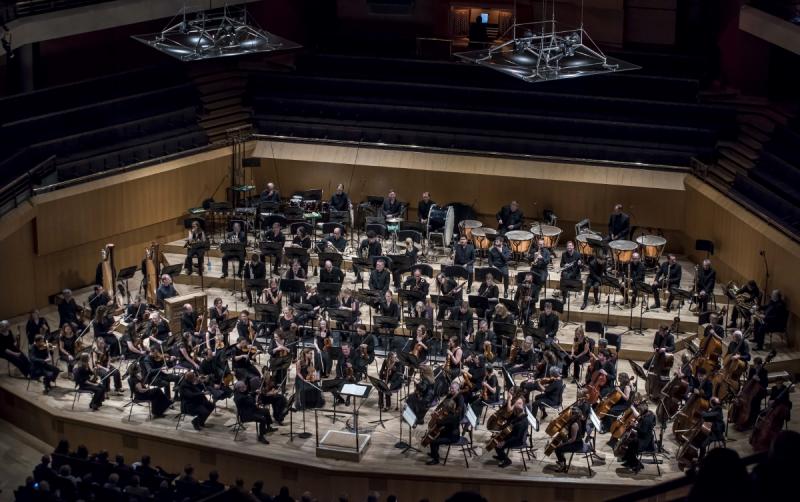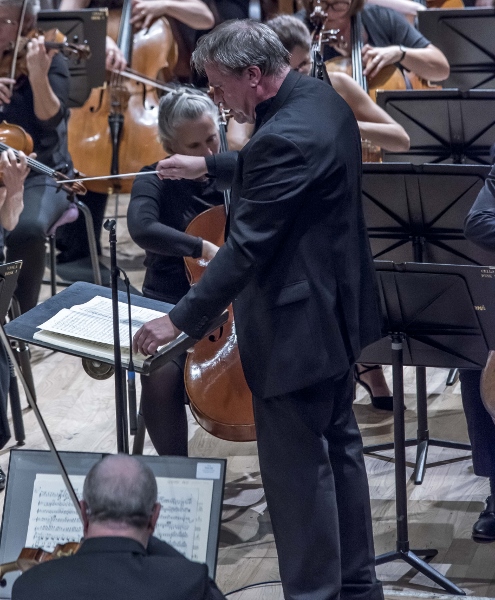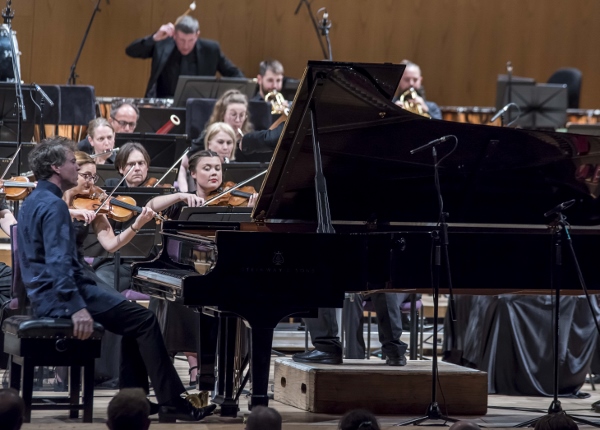Lewis, BBC Philharmonic, Storgårds, Bridgewater Hall, Manchester review - adding the Moon to The Planets | reviews, news & interviews
Lewis, BBC Philharmonic, Storgårds, Bridgewater Hall, Manchester review - adding the Moon to The Planets
Lewis, BBC Philharmonic, Storgårds, Bridgewater Hall, Manchester review - adding the Moon to The Planets
Season opener offers impact in Holst and thoughtfulness in Beethoven

The first piece by Grace-Evangeline Mason I heard was six years ago, a simple song in a multi-composer “Manchester Peace Song Cycle” performed at the Royal Northern College of Music when she was studying there.
It was striking because of its eloquent melody and evocation of child-like joy. Subsequent experience has confirmed the impression that she writes music that immediately communicates, that is often about something, rather than abstract (and she’s not afraid to tell us that), and that it does what it says on the tin.
 Her ABLAZE THE MOON, premiered by the BBC Philharmonic in the 2023 London Proms, was in the opening programme of their new season at the Bridgewater Hall in Manchester, conducted by John Storgårds. It’s written for a large orchestra and shows a mastery of complex textures and orchestral timbres – and it’s definitely about something: the image of the Moon conjured in a poem by the American writer Sara Teasdale. It even follows the poem line by line in its description of the Moon, as like a flower in a blue sky. The fundamentally tonal language is enhanced by a variety of orchestral effects, some far from traditional, and growing complexity through resonant brass-heavy chords contrasting with evocative wind and string writing.
Her ABLAZE THE MOON, premiered by the BBC Philharmonic in the 2023 London Proms, was in the opening programme of their new season at the Bridgewater Hall in Manchester, conducted by John Storgårds. It’s written for a large orchestra and shows a mastery of complex textures and orchestral timbres – and it’s definitely about something: the image of the Moon conjured in a poem by the American writer Sara Teasdale. It even follows the poem line by line in its description of the Moon, as like a flower in a blue sky. The fundamentally tonal language is enhanced by a variety of orchestral effects, some far from traditional, and growing complexity through resonant brass-heavy chords contrasting with evocative wind and string writing.
It was an inspired idea to put the six-minute piece alongside Holst’s The Planets (which requires a slightly larger orchestra, in fact). For one thing, hearing them side by side suggests that Mason may have learned a few things from Holst’s brilliance as an orchestrator. For another, since The Planets is also about something – maybe more hidden than heart-on-sleeve – namely the associations of the seven planets in the traditions of astrology, there is sense in adding the Moon to the mix. There’s been more than one attempt to add to Holst’s work by inventing music based on scientific astronomical knowledge (by referencing Pluto, for instance, or even going further into the Solar System): but the Moon, as a heavenly body often felt to influence our lives and moods, is a better candidate by far.
For The Planets suite itself, Storgårds (pictured above) brought a skilled and analytical ear. Each piece of the popular work was given with such impact that the spontaneous applause after Mars (which he did not encourage and hardly dared acknowledge) was repeated on all but two occasions afterwards: only by segue’ing quickly from Mercury to Jupiter and from Uranus to Neptune did he avoid it coming every time. There’s no harm in letting people enjoy themselves and show it: it means you’ve caught a Saturday night audience that wants to have a good time. Storgårds has a knack of adding tension in Holst’s reprises (clearly so in both Mars and Jupiter) and managed to build “Uranus, the Magician” to such a degree that it felt like the real high point of the whole work. There were lovely solos from guest principal horn KyuSung Lee, leader Yuri Torchinsky and principal cello Peter Dixon.
Storgårds has a knack of adding tension in Holst’s reprises (clearly so in both Mars and Jupiter) and managed to build “Uranus, the Magician” to such a degree that it felt like the real high point of the whole work. There were lovely solos from guest principal horn KyuSung Lee, leader Yuri Torchinsky and principal cello Peter Dixon.
The concert began with a beautifully judged performance of Beethoven’s Piano Concerto No. 3, with Paul Lewis as soloist. This wasn’t one of those approaches to Beethoven that takes everything hell-for-leather: the opening Allegro con brio seemed quite a moderate speed, and it enabled Lewis (pictured above) to present the piano role in thoughtful style, with a mix of classical elegance and occasional mystery and surprise (something shared with the orchestra’s way of playing, too). There was a sense of dialogue between solo and tutti, and when Beethoven’s glorious cadenza came it ran a range from pure rhetoric to tender romance.
The Largo movement was likewise almost leisurely, creating a sense of awe, and the final Allegro fully at ease, as if simply letting the hair down and enjoying the ride.
The Mancunian audience at this point had brought a variety of respiratory problems into the hall with them, such that the tender beauties of the music were (at least as heard in the hall) at times almost obliterated by the barrage of coughs and wheezes. Interestingly, Paul Lewis was not averse to adding a little in the way of sound effects himself, by way of occasionally bringing the winkle-pickers quite audibly down on the pedals, as if to emphasize a point.
rating
Share this article
The future of Arts Journalism
You can stop theartsdesk.com closing!
We urgently need financing to survive. Our fundraising drive has thus far raised £49,000 but we need to reach £100,000 or we will be forced to close. Please contribute here: https://gofund.me/c3f6033d
And if you can forward this information to anyone who might assist, we’d be grateful.

Subscribe to theartsdesk.com
Thank you for continuing to read our work on theartsdesk.com. For unlimited access to every article in its entirety, including our archive of more than 15,000 pieces, we're asking for £5 per month or £40 per year. We feel it's a very good deal, and hope you do too.
To take a subscription now simply click here.
And if you're looking for that extra gift for a friend or family member, why not treat them to a theartsdesk.com gift subscription?
more Classical music
 First Person: clarinettist Oliver Pashley on the new horizons of The Hermes Experiment's latest album
Compositions by members of this unusual quartet feature for the first time
First Person: clarinettist Oliver Pashley on the new horizons of The Hermes Experiment's latest album
Compositions by members of this unusual quartet feature for the first time
 Gesualdo Passione, Les Arts Florissants, Amala Dior Company, Barbican review - inspired collaboration excavates the music's humanity
At times it was like watching an anarchic religious procession
Gesualdo Passione, Les Arts Florissants, Amala Dior Company, Barbican review - inspired collaboration excavates the music's humanity
At times it was like watching an anarchic religious procession
 Classical CDs: Camels, concrete and cabaret
An influential American composer's 90th birthday box, plus British piano concertos and a father-and-son duo
Classical CDs: Camels, concrete and cabaret
An influential American composer's 90th birthday box, plus British piano concertos and a father-and-son duo
 Cockerham, Manchester Camerata, Sheen, Martin Harris Centre, Manchester review - re-enacting the dawn of modernism
Two UK premieres added to three miniatures from a seminal event of January 1914
Cockerham, Manchester Camerata, Sheen, Martin Harris Centre, Manchester review - re-enacting the dawn of modernism
Two UK premieres added to three miniatures from a seminal event of January 1914
 Kempf, Brno Philharmonic, Davies, Bridgewater Hall, Manchester review - European tradition meets American jazz
Bouncing Czechs enjoy their Gershwin and Brubeck alongside Janáček and Dvořák
Kempf, Brno Philharmonic, Davies, Bridgewater Hall, Manchester review - European tradition meets American jazz
Bouncing Czechs enjoy their Gershwin and Brubeck alongside Janáček and Dvořák
 Solomon, OAE, Butt, QEH review - daft Biblical whitewashing with great choruses
Even a top soprano and mezzo can’t make this Handel paean wholly convincing
Solomon, OAE, Butt, QEH review - daft Biblical whitewashing with great choruses
Even a top soprano and mezzo can’t make this Handel paean wholly convincing
 Two-Piano Gala, Kings Place review - shining constellations
London Piano Festival curators and illustrious friends entertain and enlighten
Two-Piano Gala, Kings Place review - shining constellations
London Piano Festival curators and illustrious friends entertain and enlighten
 Echo Vocal Ensemble, Latto, Union Chapel review - eclectic choral programme garlanded with dance
Beautiful singing at the heart of an imaginative and stylistically varied concert
Echo Vocal Ensemble, Latto, Union Chapel review - eclectic choral programme garlanded with dance
Beautiful singing at the heart of an imaginative and stylistically varied concert
 Scott, Irish Baroque Orchestra, Whelan, RIAM, Dublin review - towards a Mozart masterpiece
Characteristic joy and enlightenment from this team, but a valveless horn brings problems
Scott, Irish Baroque Orchestra, Whelan, RIAM, Dublin review - towards a Mozart masterpiece
Characteristic joy and enlightenment from this team, but a valveless horn brings problems
 Classical CDs: Voice flutes, flugelhorns and froth
Baroque sonatas, English orchestral music and an emotionally-charged vocal recital
Classical CDs: Voice flutes, flugelhorns and froth
Baroque sonatas, English orchestral music and an emotionally-charged vocal recital
 Kanneh-Mason, Britten Sinfonia, Shave, Milton Court - a grin and a big beaming smile
A pair of striking contemporary pieces alongside two old favourites
Kanneh-Mason, Britten Sinfonia, Shave, Milton Court - a grin and a big beaming smile
A pair of striking contemporary pieces alongside two old favourites

Add comment